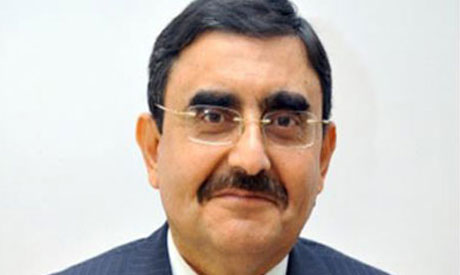
Foreign policy advisor to the presidency Essam Haddad (Photo courtesy: ikwhanonline)
President Mohamed Morsi’s foreign policy advisor Essam Haddad stated on Saturday that Egypt was keen on building its democratic institutions and fulfilling the revolution’s goals, in addition to forging a national dialogue without preconditions amongst all political factions.
Speaking in Berlin during a session allocated to the Arab Spring revolutions organised by the Trilateral Commission in the German parliament, Haddad expressed his appreciation for being chosen as the keynote speaker for the session.
He further expressed his appreciation at being granted the opportunity to present a “case study of the democratic transition in the Arab world and in Egypt as a specific case,” official state news agency MENA reported.
Haddad commented on the role of the military and the regime, asserting it was crucial that the clear division of powers and responsibilities would be realised for the creation of a truly civil state.
“In accordance with the civil democratic model, a relationship has been formulated based on respect between the elected civilian government and the military establishment whose performance was characterised by discipline and professional awareness,” Haddad asserted.
He also shed light on what he stated was a challenge in combating corruption prevalent during the former regime—coupled with grave violations of human rights—which seeped into the different state institutions and was carried into the transitional period.
Haddad stressed that it has proved that the building of democratic institutions still is one of the most “pressing tasks at this stage in an attempt to establish a principle of good governance.”
Moreover, he added that a third challenge has been the struggle with the former regime figures, who are attempting to impede Egypt’s path to democratic transformation and the realisation of the revolution’s goals.
He said, however, that despite such challenges, the government has been committed to achieving such goals, which can very clearly be seen with the first democratic presidential elections in 2012, which brought about the first democratically elected president, in addition to the formulation of a new constitution that ensures liberties and rights and upholds the principle of citizenship.
Outlining the road map for the coming period, Haddad stressed that the most needed efforts were to be exerted in improving the economic situation of the country and addressing the grievances of the majority of Egypt’s youth in unemployment. He called for increased investment in the country as it was a form of “investing in the future of Egypt.”
Haddad’s visit is also seen as an attempt at lobbying with the European Union (EU) partner nations in convincing them to push through with their loan package to Egypt. In January, president of the European Council Herman Van Rompuy announced that EU's $6.5 billion loan to Egypt will only be granted once the International Monetary Fund (IMF) seals its loan agreement with Egypt.
EU aid to Egypt in the year 2012-2013 has amounted to approximately 5 billion euros.
Moreover, last week, the EU threatened it would suspend the EU loan to Egypt if no significant progress was seen in regards to Egypt’s human rights abuses.
The Trilateral Commission which organised the conference is a non-governmental institution established in 1973, primarily to strengthen cooperation between North America, Japan and Europe. It has more recently included more countries.
Short link: